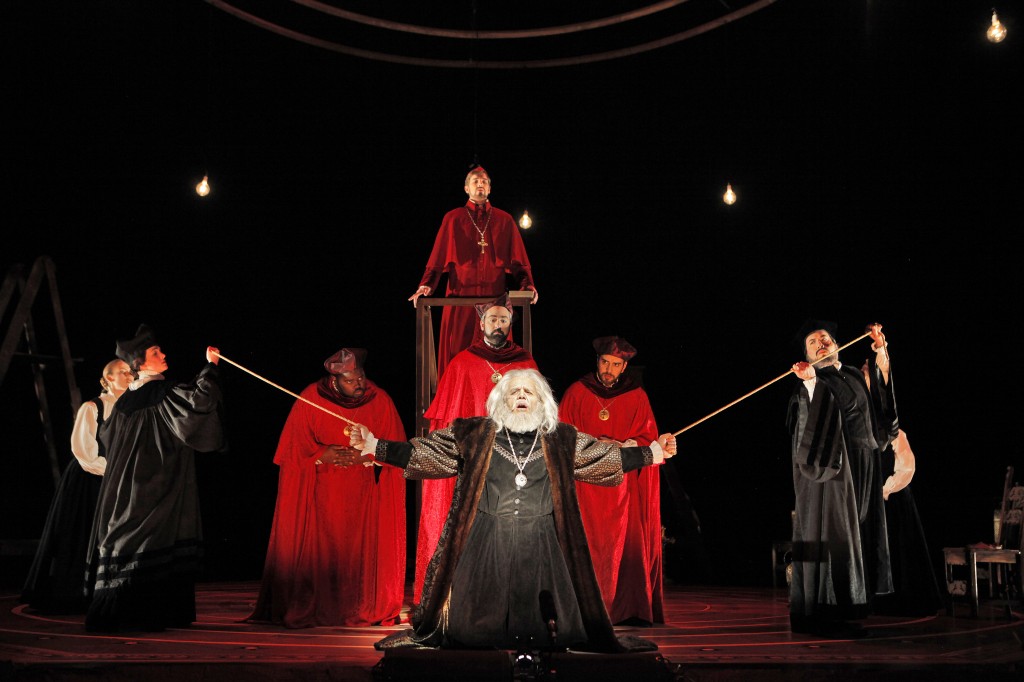
By Bob Hicks
Breaking the Glass ceiling. Again.
This just in from Portland Opera: the Philip Glass connection strikes again. You probably already knew the opera company will open its production of Glass’s 2002 chamber opera Galileo Galilei on Friday night in the Newmark Theatre. And you probably recall that Portland Opera’s recording of Glass’s Orphee – the company’s first-ever commercial recording – made Opera News’s 10-best-of-the-year list in 2010.
Well, recording no. 2 will be this production of Galileo Galilei. And as with Orphee, it’ll be the first CD of the opera. It’ll come out, once again, on Orange Mountain Music, which specializes in recording Glass’s work, and the conductor will again be Anne Manson. Release is expected late this year. The libretto, by the way, is by the excellent playwright Mary Zimmerman (Metamorphoses and her new play The White Snake, the hit so far of the current Oregon Shakespeare Festival season).
*
The book is dead. Long live the book.
Seems like everybody’s talking about the death of the book these days, and it’s true, the publishing industry is going through cataclysmic changes. But if the primary purpose of books is to feed the act of reading, maybe we’re being a little premature. Ursula K. Le Guin, Portland’s belle dame of letters, has been thinking it through and came up with some provocative conclusions on her blog post The Death of the Book. Here’s a brief taste tickler. Read the full post for much, much more:
“Is reading obsolete, is the reader dead?
“Dear reader: How are you doing? I am fairly obsolete, but by no means, at the moment, dead.
“Dear reader: Are you reading at this moment? I am, because I’m writing this, and it’s very hard to write without reading, as you know if you ever tried it in the dark.
“Dear reader: What are you reading on? I’m writing and reading on my computer, as I imagine you are. (At least, I hope you’re reading what I’m writing, and aren’t writing ‘What Tosh!’ in the margin. Though I’ve always wanted to write ‘What Tosh!’ in a margin ever since I read it years ago in the margin of a library book. It was such a good description of the book.)”
*
Linda Austin and the space time continuum
In case you missed it, I posted this essay, Stop making sense: Linda Austin’s ‘A Head of Time’, yesterday on Oregon Arts Watch. It’s about the Portland choreographer/dancer’s remarkable new group piece, which played over the weekend at Imago Theatre. Here’s a teaser:
“Chances are the narratives she puts on stage don’t make a lot of sense, at least in the old-fashioned linear way. … What you get in an Austin dance is a dream-story: fleeting images tied together by little, perhaps, but an empathetic feeling and the coincidence of being clustered together. Maybe it’s Freudian. Or maybe it’s only a cigar.”
Make sure to check Martha Ullman West’s comment at the end of the post. It adds some important information.
*
PHOTO: Richard Troxell as Older Galileo. ©Portland Opera/Cory Weaver.
 “Glass’s critics sometimes complain that the hypnotic repetitions of his music encourage listeners’ minds to wander. They’re right. But there’s attentive wandering and inattentive wandering, and when things work the way I suspect Glass wants them to the “checkout” stretches of an opera like Galileo Galilei are more like resonant doorways into parallel paths of contemplation. The music works on a subterranean level, freeing the receptive mind to explore fresh possibilities. That sort of openness to discovery, the kind of path that Galileo followed, is precisely what makes literalists nervous: If another idea becomes possible, what happens to what they believe? So the battle is joined: repress it, suppress it, stuff it back in the box.
“Glass’s critics sometimes complain that the hypnotic repetitions of his music encourage listeners’ minds to wander. They’re right. But there’s attentive wandering and inattentive wandering, and when things work the way I suspect Glass wants them to the “checkout” stretches of an opera like Galileo Galilei are more like resonant doorways into parallel paths of contemplation. The music works on a subterranean level, freeing the receptive mind to explore fresh possibilities. That sort of openness to discovery, the kind of path that Galileo followed, is precisely what makes literalists nervous: If another idea becomes possible, what happens to what they believe? So the battle is joined: repress it, suppress it, stuff it back in the box.